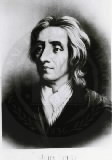




(1632-1704)
English Philosopher and Political Theorist.
Influences
- Student of:
- Influenced by:
- Students:
- Influenced: Mill
- Time Period: Modern Foundations
Education
- Christ Church, Oxford, studied medicine and science.
Career
- Personal physician of Anthony Ashley Cooper, Earl of Shaftesbury
- Politician
- Aristocrat
His friendships with prominent government officers and scholars made him one of the most influential men of the 17th century.
Major Contributions
"Let us suppose the mind to be, as we say, white paper, void of all characters, without any ideas; how comes this to be furnished? . . . whence has it all the materials of reason and knowledge? To this I answer, in a word, from experience."
"Locke's considerable importance in political thought is better known. As the first systematic theorist of the philosophy of liberalism, Locke exercised enormous influence in both England and America, including major influences upon the U.S. Constitution"
Publications
- Two Treatises of Government (1690)
- Concerning Human Understanding (1690)
- A Letter Concerning Toleration (1689)
- Some Thoughts Concerning Education (1693)
- The Reasonableness of Christianity (1695)
References: 10
Image Courtesy of the National Library of Medicine
Home | Interactive
Map | Alphabetic Index | Time
Period Index
Hot Topics | Map - PDF | References | Contributors | Comments
For further information please contact
Content questions: Dr. Jonathan
Plucker (jplucker AT jhu.edu)
Technical questions: Technical Co-Director(intelltheory AT gmail.com)
Copyright © 2016
Last Modified:
29 April 2018